At Hari Shree, we are committed to a balanced development of the whole person. Holistic education is educating the whole person beyond just academics. We aim to help children develop physically, emotionally, intellectually, cognitively and spiritually using a comprehensive learning approach. The curriculum is supported by robust co-curricular and extra-curricular programmes, Culture based value education and leadership opportunities.
We provide a safe and supportive environment where students are guided to reflect on themselves and the impact of their actions on the local and global environment and lead children to take ownership for their learning.

Art is an integral part of the curriculum. Teachers identify age-appropriate kinaesthetic activities and incorporate them into the curriculum.
Students are encouraged to create their own works of art for festivals and other special occasions. The complexity of the activity increases with each grade level.

Music can enhance cognitive function in children. Musical activities (such as playing an instrument, singing or just listening to music stimulate the brain and improve concentration. Children develop a sense of rhythm and learn to appreciate various forms of music.
Children learn different songs from regional, folk, devotional and Carnatic styles. Lessons on Carnatic, vocal and voice culture are given to improve their singing.

Children get an opportunity to explore various styles and genres under Indian Dance Forms. Children learn classical, semi classical and fusion dance forms.
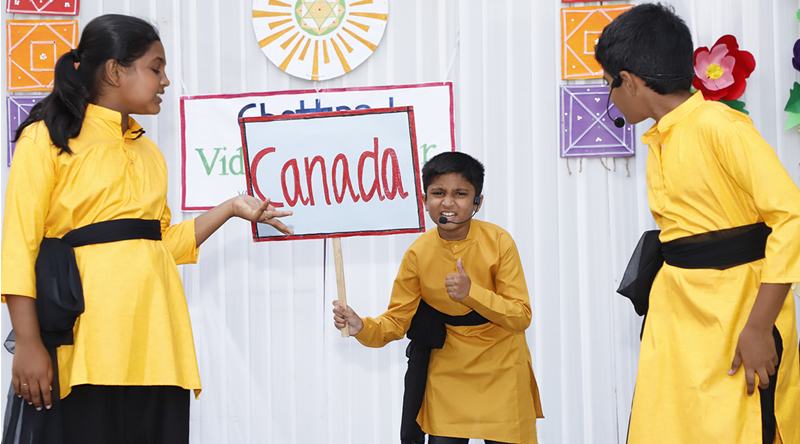
Drama & Theatre is a collaborative form of performing art which is offered to primary and middle school students. Theatre aids in enabling students to develop their sensitivity, understand group relationships and dynamics, nurture good enunciation and diction. Theatre classes are designed to offer students the space for equality, equity, empowerment and freedom.
The theatre curriculum focuses on enhancing the intuitive, instinctive, impulsive and imaginative skills of the students. It is designed to empower imagination and articulation so that students are more knowledgeable and expressive about themselves and their surroundings.
Children are engaged in plays which form a big part of festivals, annual day events and special occasions.
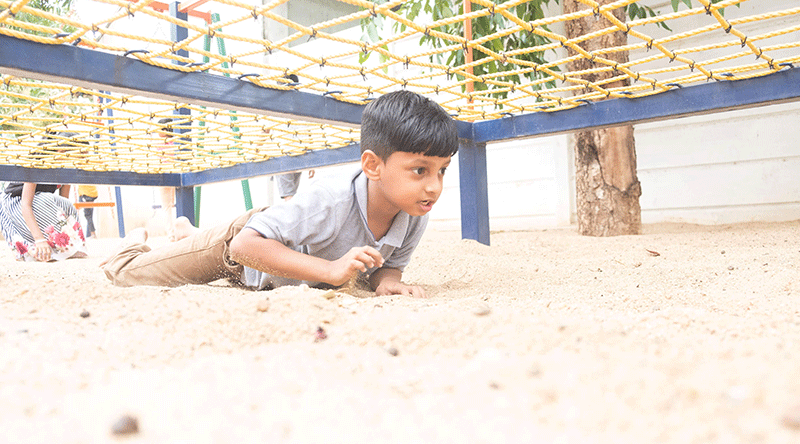
Sports is an important component of the Hari Shree curriculum from pre-primary to high school years, as it promotes an overall development, fitness and agility.
A systematically planned indoor and outdoor playground in the pre-primary campus ensures mastery of perceptual and motor skills needed for reading, writing and math. Sports activities at this level are designed to enhance socio-emotional skills, self discipline and as team building activities that promote working together.
During primary years, sports promote social skills and collaborative work. It improves relationships with peers, helps them to follow simple rules, adhere to boundaries and be introduced to the concept of working in a team.
Middle and high school sports focus on developing accountability, responsibility, resilience, sportsmanship and team spirit. In addition, sports produce endorphins which reduce stress and induce calmness in students.
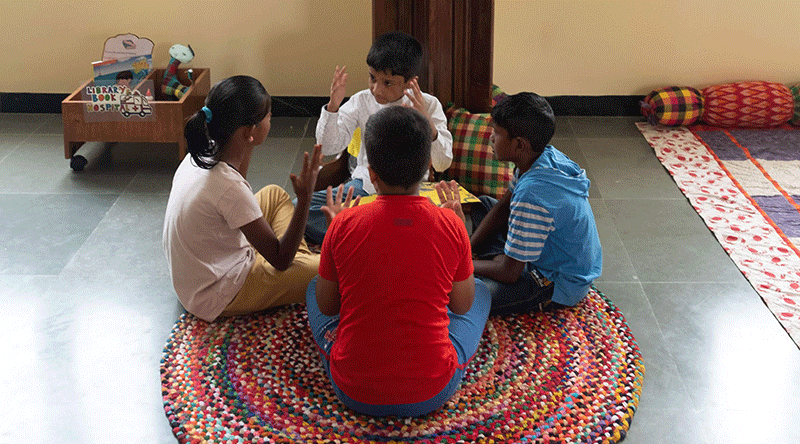
The Leader in Me programme is based on “The 7 Habits of Highly Effective People®” by Dr. Stephen R. Covey, helps children inculcate effective habits for success. This program is designed to help children build confidence, encourage goal setting and discover their true potential and are given opportunities to lead. As leaders, they become active, engaged partners in their own learning. They learn to listen to new ideas, work together to achieve results, and motivate one another to be the best. The program helps them become self-confident, take initiatives and responsibilities, understand that everyone has the potential to lead and contribute.

The Sanskrit phrase ‘VASUDHAIVAKUTUMBAKAM’ means ‘the entire world is ONE family, where every being is interconnected and interdependent’. Our children will understand that their actions create ripples of change as they think globally and act locally to create an impact in the society.
“Sustainable development is development that meets the needs of the present without compromising the ability of future generations to meet their own needs.” UN World Commission on Environment and Development. It is our vision to create compassionate responsible global citizens who contribute to a sustainable future. We want our children be aware, be inspired to take action that creates positive impact. Global Citizenship is part of the curriculum from grades 4 to 7. Children take up projects throughout the year to work on solutions towards sustainable development. The areas of learning are chosen in alignment with UN SDG Goals. Our Global Citizenship program encourages children to understand global issues, appreciate the importance of using the earth’s resources mindfully and work towards a sustainable future. They use critical thinking to implement solutions in their communities, collaborate with one another, and share their learnings; enabling them to be responsible, global citizens.
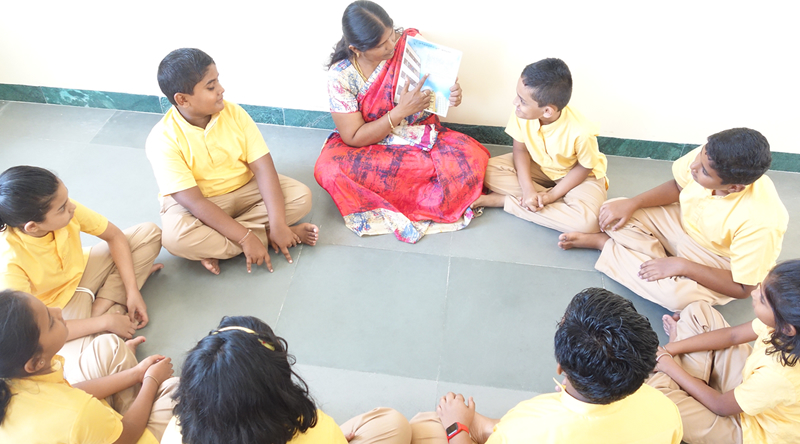
The Neelkathai Paadathittam: The Neelkathai Paadathittam (Long-Story Program) is a Tamil literacy program for primary students that focuses on child-centered literacy acquisition. Based on a story that runs through the whole year, it develops fluent reading and creative writing without relying on rote learning. The program facilitates rich vocabulary acquisition and literary expression and focuses on student interest and engagement by engaging learners cognitively, socially, and emotionally. It is based on the whole-language approach to language teaching and learning.

Assemblies are an integral part of the morning schedule. They provide opportunities for students to come together and interact with larger groups, present their views, address common issues, showcase their skills, and celebrate special days and festivals.
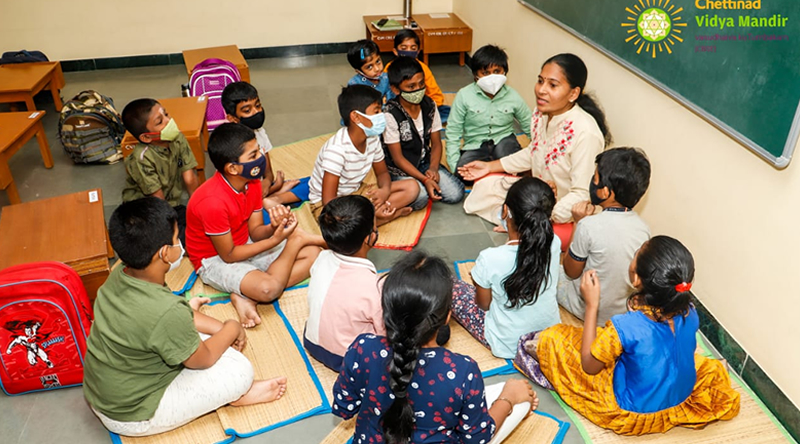
The school day for children begins with Circle Time for about 20-30 minutes. Our circle-time activities are multi-faceted and promote the importance of both the individual and the community. Mindfulness, brain power yoga, sharing experiences and listening to others are emphasized in this time, to promote empathy and sensitivity.

The well-being of a child stems from the feeling of safety and security and extends far beyond just physical environment. The mental and emotional wellness of the students is an important part of the school.
All images and text @ Copyright Chettinad Hari Shree Vidyalayam, Coimbatore. All Rights Reserved.